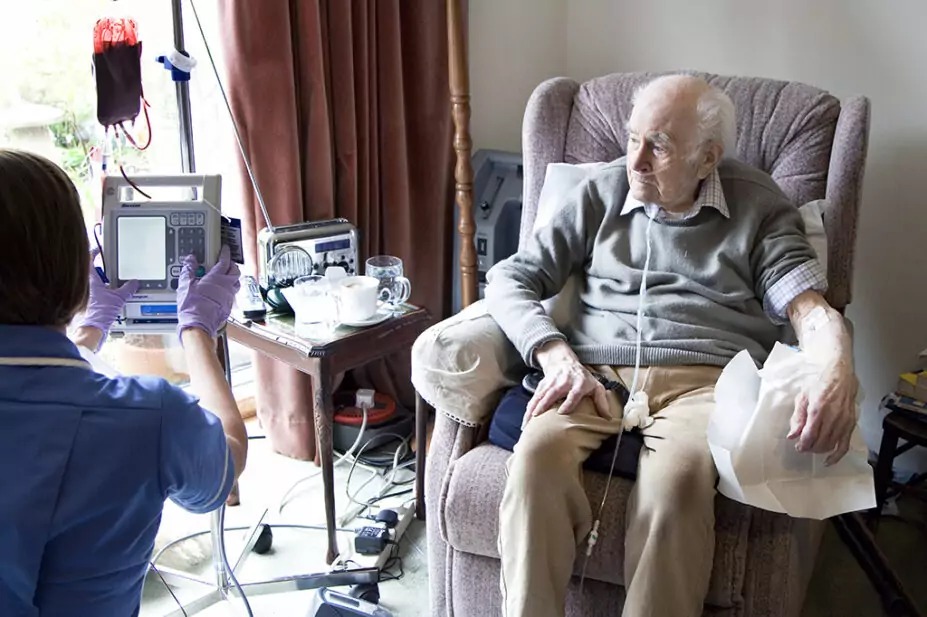
LIFE IN VIEW/SCIENCE PHOTO LIBRARY
Two-thirds of patient safety incidents recorded during hospital trusts’ monthly reporting period for homecare medicine provision were for services provided by the company Sciensus, an investigation by The Pharmaceutical Journal has revealed.
In response to a freedom of information request sent to 131 hospital trusts in England in August 2023, 32 trusts recorded 417 patient safety incidents during their most recent monthly reporting period, which ranged from May to July 2023.
Some 66% of these incidents (277) related to services delivered by homecare provider Sciensus, despite providing medicines to fewer than half (44%) of the 96,849 patients covered in the data.
A patient safety incident is defined by the National Reporting and Learning Service as “any event that led to actual harm to a patient or had the potential to harm a patient”.
The findings come after the House of Lords Public Services Committee opened an inquiry into homecare medicines services in May 2023 following press reports of complaints from patient organisations and others about the service provided. The inquiry heard evidence from patient groups, regulators, homecare companies and the government during the summer and the committee will publish its report on 16 November 2023.
Sciensus was previously known as Healthcare at Home and is one of the UK’s largest homecare companies.
The data also uncovered that Sciensus was a poor performer on “failed” deliveries, defined as those that did not arrive on the scheduled day.
Among 34 trusts that used Sciensus to provide homecare for 48,237 patients and provided data about failed deliveries, on average they said that 8% of Sciensus deliveries failed. This was the highest average rate reported by trusts that gave us data on failed deliveries by different providers.
A spokesperson for Sciensus told The Pharmaceutical Journal: “We work very hard to ensure people get their medicines on time and our patient services have a 95% satisfaction rating. Our clinical specialists, including our pharmacists, inform a clear policy of being open and transparent in reporting any incidents to ensure learning across all stakeholder groups.”
The spokesperson added that Sciensus would welcome an NHS review to ensure a common approach to reporting incidents is adopted across the sector. “We believe it is crucial to ensure consistency in how incidents are reported, a view shared by patient groups who raised it in the recent House of Lords inquiry,” they said.
HealthNet Homecare had the highest average rate of late deliveries — where the medicine arrived on the same day but not at the planned time. Among 34 trusts that used HealthNet to provide services for 23,423 patients and provided data on late deliveries, they said that an average of 16% of deliveries arrived late.
Chris Carver, deputy chief executive of HealthNet Homecare, told The Pharmaceutical Journal that the company is very strict about reporting “late” deliveries, which it classifies as those not delivered within a two-hour timeslot, even if they are only a minute early or late.
“Where deliveries are outside the slot, over half were delivered early and 90% were within an hour of the slot,” he said.
Homecare medicines services are regulated by the General Pharmaceutical Council (GPhC), the Care Quality Commission (CQC) and the Medicines and Healthcare products Regulatory Agency (MHRA).
A spokesperson for the CQC told The Pharmaceutical Journal that it has carried out a review of concerns raised about Sciensus: “[The review] identified issues that lie within the remit of our partner agencies — the MHRA and the GPhC. Both organisations have already taken action to reduce the risk identified. We continue to liaise closely with MHRA and GPhC as their enquiries progress.
“As with other providers, we also continue to monitor and engage with Sciensus regularly, to ensure people using services are safe. This may include announced or unannounced inspections as necessary.”
A previous CQC inspection of Healthcare at Home (now Sciensus) in 2020 rated it as “inadequate” and placed it into special measures. However, a re-inspection in summer 2021 rated the service as “requires improvement” on safety but “good” overall.
Similarly, in November 2020, the GPhC required Healthcare at Home to complete an improvement action plan following an inspection. A follow-up inspection of Sciensus in April 2022 found that standards were now being met.
The GPhC told The Pharmaceutical Journal: “Our priority is ensuring people receive safe and effective pharmacy care. When a registered pharmacy provides a delivery service, we would assess this against the requirements of our standards for registered pharmacies. If there are issues that affect patient safety that we are made aware of, we will investigate further, and will carefully consider the points raised here to see whether further action is required.
“We continue to work with MHRA and other regulators to ensure patient safety is protected.”
NHS England told the House of Lords Public Services Committee inquiry that it is carrying out a “desktop exercise” to understand how governance and accountability work in the homecare sector.
In Scotland, a national review of homecare medicines services is underway following a campaign by the British Society for Rheumatology and five other stakeholders. A Scottish government spokesperson told The Pharmaceutical Journal that the review will seek views from a broad range of stakeholders, including patients, through a call for evidence.
“Recommendations will be presented to the chief pharmaceutical officer by the end of the current financial year,” they added.


